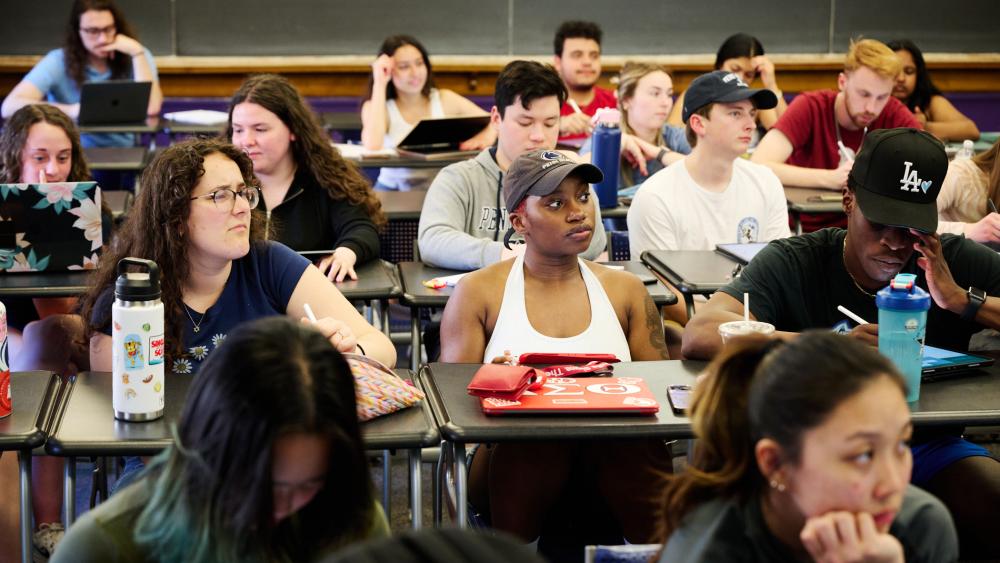UNIVERSITY PARK, Pa. — Two recent Penn State graduates shared how the skills they honed as Guided Study Group leaders helped them land important roles right out of college.
Described by one former leader as “mini professors,” the students who run Guided Study Groups (GSG) say they build skills in presenting, teaching, communicating and much more. They’re responsible for attending lectures, developing study materials, communicating with instructors, scheduling study sessions and helping their peers understand course material and find academic success. This unique position of leadership, mentoring and teaching was what led directly to job offers, according to Michael Shaqfeh and Michael Macdonald.
“From seven semesters of GSG experience, I can say without a doubt that the GSG experience was integral to landing my first job out of college,” Shaqfeh said.
He earned a role at Johnson & Johnson in the competitive Global Operations Leadership Development program, described as having “challenging work rotations with classroom and online training over a two-and-a-half-year period.”
“Being a GSG leader prepared me for this opportunity because it has helped me practice the type of skills needed for management positions in my future and with the presentations that’ll be required in my job,” Shaqfeh said. “Understanding how to interact with people, provide clarity on questions and describe topics in various different ways to promote understanding will be essential to success in this role, and I have practiced all of that every week with GSG.”
Shaqfeh graduated this past May from Penn State with a bachelor’s degree in chemical engineering and a minor in accounting. For seven semesters, he was a Guided Study Group leader for “ECON 104: Introductory Macroeconomic Analysis and Policy,” taught by Bill Goffe, teaching professor of economics. Shaqfeh’s brother, Nick, was also a Guided Study Group leader for the same course.
“Mike was a joy to work with and was extremely dependable,” Goffe said. “Issues never came up and students felt that he really helped them. I wish him the best as he embarks on his career following his graduation from Penn State.”
Under the leadership of Penn State Learning, the University’s official tutoring and learning services office, the Guided Study Groups program primarily supports foundational courses in math, economics, science and statistics. Penn State Learning provides a staff of professional educators, who through training and observations, help the leaders hone their skills and abilities to best support the learning of their peers. Being a GSG leader comes with a lot of responsibility, but one that can also be incredibly rewarding, said John Correll, a Guided Study Group coordinator with Penn State Learning.
“You get an opportunity as an undergraduate that you can’t get anywhere else at the University,” Correll said of Guided Study Group leaders. “Although this role has a lot of responsibility, it also offers rich teaching experiences. Our GSG leaders don’t lack for passion, and it’s amazing to see how each semester they go above and beyond for their fellow students.”
Michael Macdonald, who graduated with a bachelor’s degree in aerospace engineering and a mathematics minor, started off as a learning assistant for “PHYS 211: General Physics Mechanics.” He contacted the instructor to look for ways to help students even more and eventually discovered the Guided Study Group program.
“I knew I liked physics, and that was enough for me to do well at the job at first, but I realized quickly that so much more goes into being a good educator,” Macdonald said. “For example, you must be able to explain the same concept in different ways if you want all the students to understand it. This is because every student learns differently. What is easy for some may be very difficult for others, especially in physics.”
Macdonald said he would continue to refine his approach over multiple semesters and gained an ever-deepening understanding of what it means to teach and learn. This experience helped him earn an instructor position with the Naval Nuclear Power Training Unit. After officer school and coursework, he will teach nuclear reactor operations to other officers.
“I have GSG to thank for my job because I would have never known that I love to teach,” Macdonald wrote earlier this year. “I think it is important for every college student to have the opportunity to teach in some capacity. Not just to spread information, but to learn about how other people think and what causes something to click in their brains. GSG is something that I look forward to every week and I will surely miss it; I wouldn’t have wanted any other job while pursuing my degree.”
To learn more about the Guided Study Group program, and how to become a GSG leader, visit pennstatelearning.psu.edu.

